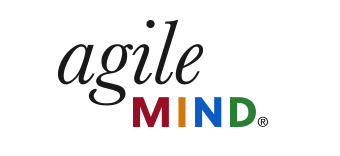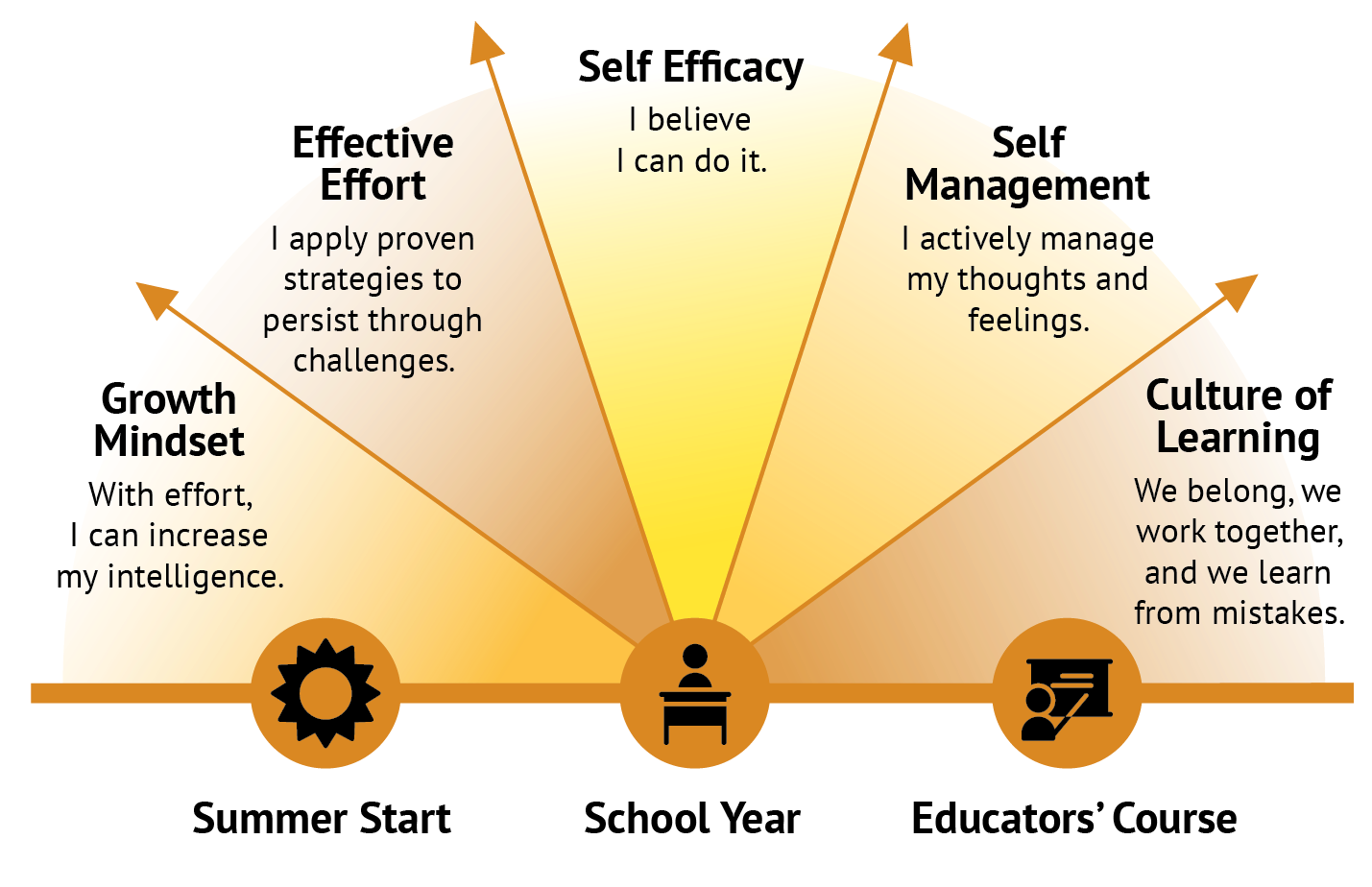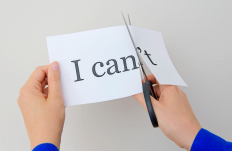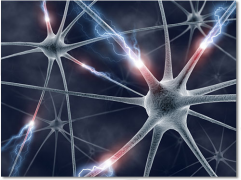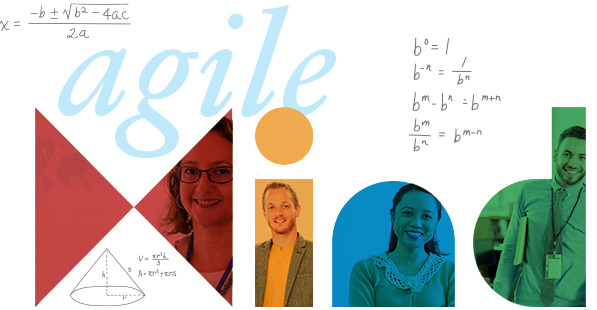Build a Learning Mindset: Strategies for a Strong Year
As in any new academic year, the air is thick with anticipation, the promise of growth, and concern about this challenging time for educators. Will this year fulfill the promise of public education? Will classrooms look, sound, and feel like engaging centers of learning? Enabling learners to thrive and supporting teachers in cultivating dynamic, engaging, and welcoming classrooms begins when we build a learning mindset. Academic Youth Development (AYD) is a school-year and summer program developed by experts in learning at The Charles A. Dana Center and Agile Mind. This research-based program brings our shared vision to life, helping educators strengthen students’ academic identities, foster productive persistence, and enhance the personal agency that propels students to participate in school fully.
AYD is grounded in established and emerging research about the impact of social, emotional, and academic development on students’ learning. The program has supported tens of thousands of students and educators. Leveraging findings ranging from those of the beloved expert psychologist Carol Dweck to the newest research of trusted learning scientist David Yeager, the program develops students’ learning mindsets, academic motivation, and sense of belonging in school. It helps educators take inspiring ideas and apply them to make them stick.
What Does the Best Research Tell Us?
Mindsets about intelligence matter (and context matters too). Well-designed “growth-mindset” lessons—teaching that abilities can grow with effort and strategies— produce meaningful, positive gains in grades, with the largest benefits for lower-achieving students and in schools that support challenge-seeking. But the teaching of a growth mindset has to be applied appropriately if it is to stick.
Belonging shapes achievement, especially at key transitions. “Belonging” interventions normalize struggle and improve achievement, persistence, and retention. Again, when applied to learning, that is part of students’ everyday “belonging” becomes established as a reality.
SEL programs improve both behavior and academics at scale. Meta-analyses of proven school-based social-emotional learning show improvements in academic skills and behavior. Benefits persist far beyond implementation.
A comprehensive approach is crucial. Building a school- or district-wide SEL foundation—with explicit instruction in emotion regulation, problem-solving, and relationship skills—supports positive behaviors and academic gains, ensuring meaningful and lasting impact for more students. While individual teachers and classroom initiatives may have limited benefits, buy-in, consistency, and fidelity to the work among the adults lead to broad and measurable gains.
So how can educators and families apply these insights and still do the rest of their jobs?
It Starts by Building a Learning Mindset
We now know that everyone can learn and improve, and that success is most often the result of how we view ourselves as learners and our ability and willingness to persist in the face of challenges. Students who know how to push themselves and apply effective strategies are ultimately more successful, in school and beyond.
Academic Youth Development helps students build a learning mindset, fostering positive beliefs about themselves and their ability to learn, and equipping them with proven strategies for success in mathematics and all academic subjects. Families play a crucial role in this process, and can actively support students’ learning, building their confidence and resilience.
How Families and Learners Build Learning Mindsets
Redirect negative beliefs:
Help your child reframe challenging moments. Instead of saying things like, “I/we can’t do it” or “This is too hard,” try, “You haven’t figured this out, YET! But I’ll stick with you while you stick with it” or “It’s okay to be confused or frustrated. Everybody feels that way when they work through challenges.”
Focus on effort, strategies, and progress:
Emphasize that learning is a process where mistakes and struggles are natural. Avoid focusing solely on outcomes like grades or inherent “smartness.” Instead of “You’re so smart!” or “Great job—you got an A!”, say, “I’m so proud of how you worked through _____!”
Highlight brain growth:
Explain that working hard on a challenge creates new connections between brain cells, giving our brains more pathways to use and making us smarter. Encourage children with, “The harder you work, the smarter you can get! Every time you learn how to do something new, you’re rewiring your brain.”
Model how to learn from mistakes:
Demonstrate that errors are growth opportunities. Share examples from your own life, saying, “Looks like I missed the mark—I bet I can figure out where I went wrong.” A positive reaction to mistakes shows children they can learn and grow from them.
Reflect on challenges and successes:
Prompt your child to consider what strategies worked and what they learned. Ask, “What strategies can you try? What resources do you have to help you figure it out?”. This helps them tackle future challenges more easily.
How Educators Build Learning Mindsets
For educators, Agile Mind provides robust support for creating “thinking classrooms” where class norms and routines are designed to foster students’ thoughtful engagement and persistence.
Leverage explicit learning mindset tools:
With the right supports, educators can instill in students the ability to persist through challenges and the belief that they can be successful. Explore what happens in the brain when we learn, and develop students’ metacognitive strategies and skills to help them better manage their thoughts and feelings and redirect their academic behaviors.
Employ proven norms and routines:
Leverages students’ experiences and prior knowledge as a foundation for learning. Support students in developing positive mathematical identities to help all learners see themselves as capable and valued participants in mathematics classrooms. Proven routines support inclusive representation, respect for others, and productive classroom discourse, emphasizing collaboration and reinforcing shared norms that promote cooperation and a culture of belonging.
Provide rich, engaging tasks:
At the heart of fostering critical thinking are worthy tasks. They are open-ended, require complex problem-solving, and offer multiple entry points for students to demonstrate their understanding. They deal with interesting and relevant content, encourage collaboration, and foster individual accountability.
Practice purposeful questioning:
Employing this vital practice equips teachers to make student thinking visible and ensures students are making deep connections. Teachers need explicit resources to:
- Plan questions, anticipating student responses and potential misconceptions.
- Pose multiple types of questions to advance student thinking without funneling them to a single answer.
- Employ open-ended questions to encourage student thinking and discourse.
- Ask clarifying questions that deepen mathematical understanding.
- Allow sufficient wait time for students to formulate thoughtful responses.
Offer formative assessment:
This planned process is essential for responsive teaching. It involves collecting evidence of student learning and using it to adjust instruction or help students modify their learning tactics. Formative assessments embedded in our programs can be implemented across various timeframes, from long-cycle (weeks to a year) to minute-by-minute adjustments within a lesson.
Transformative Impact of Building Learning Mindsets
When students build their learning mindsets and academic confidence and are supported in these ways, they work harder and persist longer. They gain deeper understandings of concepts, construct learning in diverse contexts, develop effective problem-solving strategies, improve collaboration skills, and gain intellectual independence and confidence. They believe they can do the work, even when it is hard.
Academic Youth Development (AYD) goes beyond individual students and has been proven to transform classroom engagement and culture by building student leaders who can share their skills and information with peers. The program fosters a strong culture of learning that welcomes all learners and encourages engagement, collaboration, persistence, and academic achievement. Stronger relationships between students and their teachers, peers, and families are the result. Independent evaluations of AYD have documented significant achievement gains in middle and high school mathematics, with particularly strong gains among low-income and minority students.
Partnering for Success
Agile Mind is committed to partnering with districts, educators, and families to transform the teaching and learning experience, providing every student the opportunity to succeed in school and beyond.
Click here for more information about the AYD program or contact us at info@agilemind.com.
We look forward to partnering with you to build learning mindsets and classroom cultures that power a year of growth and achievement!!
